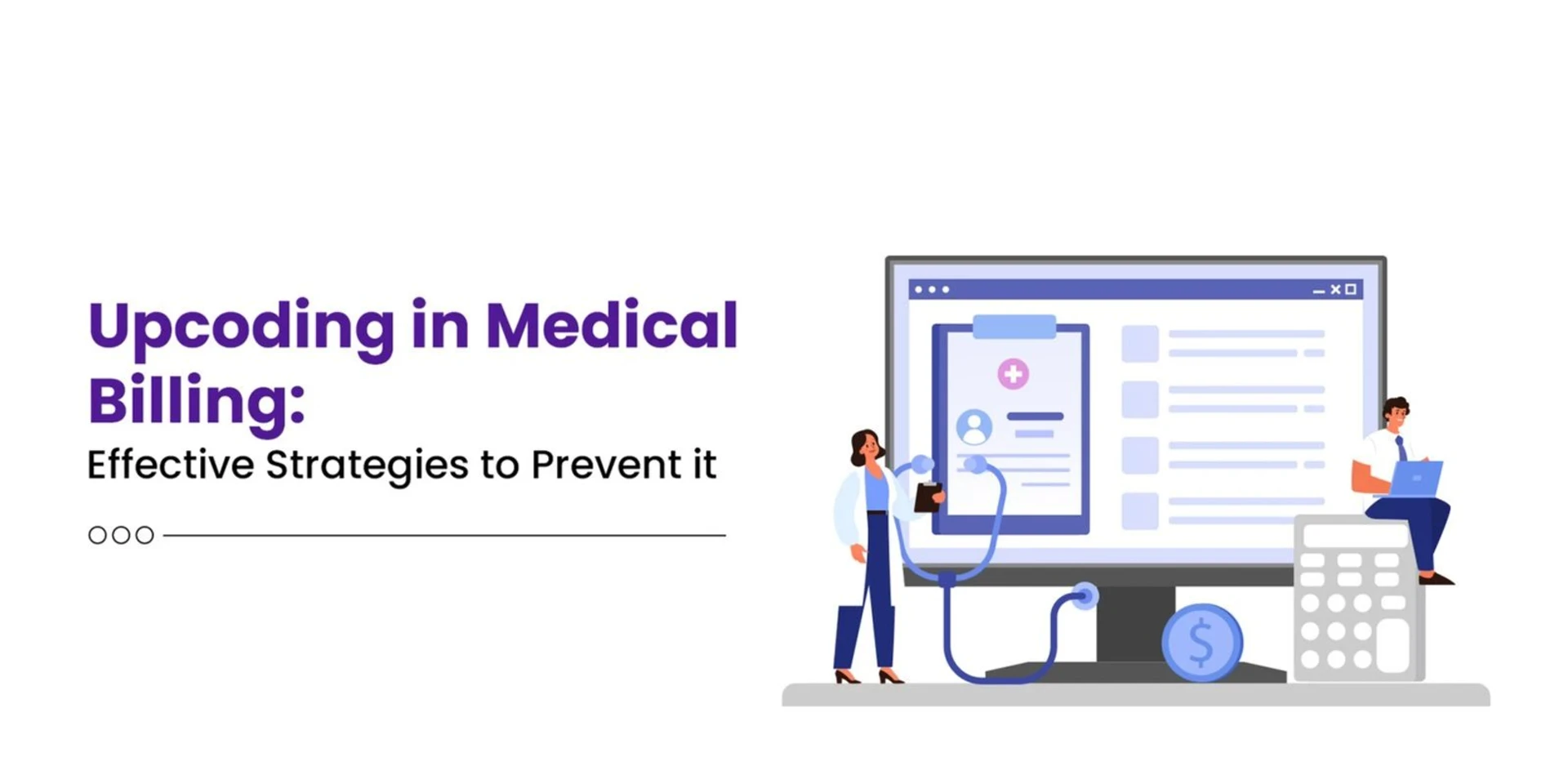Healthcare providers leave no stone unturned to ensure error-free medical billing practices, but upcoding remains a major issue. Just like downcoding in medical billing, upcoding can also have serious consequences for healthcare organizations, including financial penalties and reputational damage.
With growing regulatory and compliance needs, understanding and preventing upcoding have become critical.
In this blog, we will look at:
- What is upcoding?
- How does it affect healthcare organizations?
- Most importantly, five effective techniques to avoid it.
Whether you are a hospital administrator, billing specialist, or compliance officer, these insights can help you keep upcoding at bay.
What is Upcoding in Medical Billing
Upcoding occurs when healthcare organizations inaccurately document higher-level codes. It is critical to distinguish between coding mistakes that are accidental and purposeful upcoding. Though mistakes may arise merely because of the complexity of medical billing and coding, purposeful upcoding is considered healthcare fraud and can have substantial legal and financial implications under federal law.
Impacts of Upcoding in Medical Billing
Here is how upcoding impacts a healthcare organization:
Legal Consequences
Upcoding is a serious offense as per the federal and state laws. In recent times, hundreds of healthcare organizations have provided multi-million-dollar settlements due to allegations over upcoding. The regulatory bodies take a great deal of seriousness when it comes to upcoding. For instance, some providers who have been found guilty of upcoding have lost their right to participate in a federal healthcare program and have been asked to cease their practice.
Reputation Damage
Reputation is perhaps the most valuable asset for healthcare providers. When an organization’s upcoding violations become the talk of the town, it severely and sometimes permanently damages its reputation.
It then becomes difficult for such organizations to recover from reputational harm. They certainly lose their ability to attract new patients and maintain their relationships with referring physicians. In addition to this, it also affects the standing of the organization within the medical community.
Increased Scrutiny
Once the healthcare provider has been pinpointed for upcoding, both insurance companies and the regulatory body increase their scrutiny of the practices.
This means all the claims will be thoroughly looked into. There will be likelihood of increased denial rates, and payment will be slowed down as the insurance company performs thorough assessments on every claim.
All this will also cause operational inefficiencies and increase administrative costs for the healthcare provider, followed by an increased administrative burden on the staff due to frequent audits.
Financial Instability
Apart from the immediate fines and penalties, upcoding significantly burdens healthcare organizations. They put themselves into a set of financial cascades that may threaten their existence in the industry.
From the expense on legal defense to revenue loss during investigation, providers tend to burn their pocket as a result of upcoding.
Organizations experiencing high cases of upcoding require extremely high investments in new systems of compliance and training of staff to completely avoid it in the future. Plus, the financial implications of legal penalties and operational costs can be devastating and sometimes result in bankruptcy or the shutting of practice.
Measures to Preventing Upcoding in Medical Billing
Now that you know the meaning and impacts of upcoding in medical billing, here are some effective strategies to prevent it in your healthcare organization:
Ensure Accurate Coding
Implementing strict measures to make coding error-free is the first step to avoid upcoding. The system of checks and balances in the organization should be robust to ensure every service is coded correctly. You can establish guidelines for documentation to align with the latest rules for CPT and ICD.
Not to forget, reviewing of coding patterns must be done on a regular basis to watch out for any disparities in the patterns. Besides, you can also implement advanced coding resources and tools that facilitate both accuracy and consistency in the billing operations.
Adhere to Ethical and Legal Standards
Healthcare providers should also develop a comprehensive compliance program that aligns with HIPPAA requirements and other applicable medical provisions. This compliance program should consist of well-defined policies and procedures on the right medical billing practices. The staff members should be clear about the essence of ethical billing practices as well as the repercussions in case they fail to comply.
This step will ensure on-going compliance with ever-changing regulations and billing requirements. Healthcare organizations, be it small or big, should also offer an environment that encourages integrity where ethical concerns are addressed without fear of retaliation.
Validate Patient Data
The accurate validation of patient data is equally critical to avoid coding mistakes that often lead to upcoding. The providers must carry out thorough verification processes for patient data, such as patient names, birth dates, insurance information, and medical records.
This can also include developing protocols for revising patient data regularly and verifying the same information across various systems. In addition to this, implement artificial intelligence (AI) in medical billing and train staff to validate patient identity at several points of contact and ensure accurate records of all patient encounters. In essence, error-free validation of patient data makes sure that services are billed to the right patient and that documentation supports the level of service provided.
Conduct Regular Internal Audits
Internal auditing is also one of the effective steps to prevent and detect upcoding. Healthcare organizations should create a regular cycle of internal auditing to check the accuracy of coding and billing patterns to ensure quality of documentation, accurate coding, and compliance in billing. Most importantly, organizations must take corrective measures and train the staff further once any discrepancies are found.
Audits reveal problems early and reflect an ongoing commitment to compliance. Also, the findings of audits and corrective actions carried out should be documented in detail for future reference.
Wrapping Up
As the healthcare industry continues to evolve with complex billing regulations and coding requirements, preventing upcoding has become more crucial than ever.
While implementing internal strategies is essential, healthcare providers might also consider partnering with professional medical billing companies. These specialized organizations bring expertise, dedicated resources, and advanced technology to ensure accurate coding and compliance. Outsourcing can provide an additional layer of security and efficiency in your billing processes, helping you focus on what matters most – delivering quality patient care.
Remember, maintaining billing integrity isn’t just about avoiding penalties; it’s about building a sustainable, trusted healthcare practice that serves its community with honesty and professionalism.






